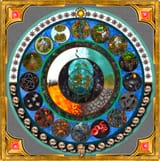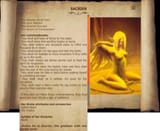>>96160219 (OP)I've thought about this a fair amount.
Most of the time players do not want to be heavily limited in what they can and cannot do for reasons that don't make immediate sense, and players want to be able to internalise the list of unusual things about the world fairly easily.
Making a fantasy religion or fantasy pantheon good for an RPG is like many other aspects of worldbuilding. You need to have things players can use as shorthand and comparisons for our world, and you shouldn't change everything just for the sake of it.
There is a sliding scale of immersion, and it is not the same for everyone.
I like to use measurements and calendars as an example.
>Calling your months august and october implies the existence of a man namd Augustus and the use of roman numbers (but the moving of those numbers around by the insertion of new months)>having a solar calendar that matches our real one implies things about the planet and the culture>having measurements match real ones, be it metric or imperial, also implies thingsBUT if you demand your players memorise and use a fake calendar of fourteen spanduls each divided into three brepita, a brepit being nine glotha long... your players will be stonewalled by the sheer amount of digesting they need to do of your lore before they start playing.
When a novel presents its lore, it does so as part of a linear story that, ideally, has been calculated to not overwhelm the reader and to introduce things at a reasonable pace. It can also not explain things, let the reader assume or wonder, because the book does not answer questions. A player at your table can put his hand up and say "hey GM, why IS the fourth Spandul called Bogdabriet?"
If you reinvent everything and tell your players the price of entry to your games is digesting a massive loredump, they are gonna be scared off. Everything
>>96160630says is good, drip feed it. You can't pre-prepare it in an ideal order like a novel can, so react to your players instead.


